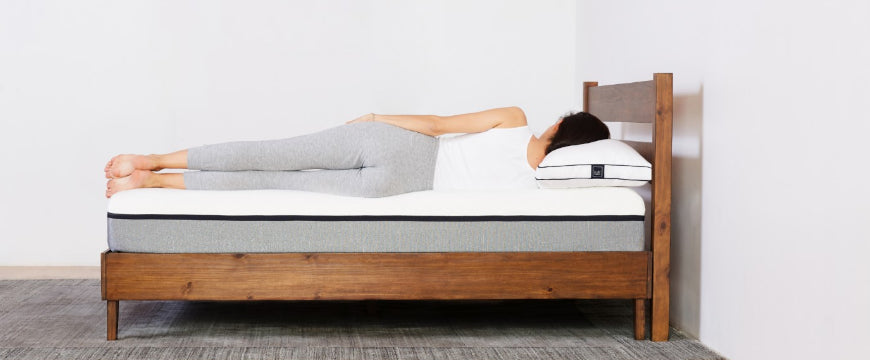
5 Ways to Tell if Your Mattress Is Causing Back Pain
|
|
Time to read 3 min
|
|
Time to read 3 min
Getting a good night’s sleep is meant to be a consistently and wonderfully relaxing, rejuvenating experience. With all of the physical and mental benefits quality sleep delivers after just one night, it should be something to strive for every day. However, a full 8 hours of sleep can have some negative effects if you’re sleeping on the wrong mattress, leading to dreaded back pain that can stunt your mobility and mood throughout the day. That’s because mattresses that are too soft, saggy, or hard may place excessive pressure on your joints or may not properly support your spine. Back pain is commonly caused by medical conditions, age, posture, and weightlifting with improper form. However, the presence of any of these doesn’t necessarily invalidate your mattress as a contributor to the pain. If you’re looking for the cause of your back pain, it’s important to identify whether your mattress is a source of your aches. Here are five signs that your mattress is the culprit of your back pain:
Do you experience noticeably less aches after sleeping in a different bed? Has this been a consistent pattern? Does the pain return after a night or two in your own bed?
If you experience aches and pains right as you get out of bed, it’s likely that the mattress you were laying on all night is the cause. This timing is especially noteworthy if you’re not feeling that pain the minutes before bed. Note the type of pain you’re feeling. Is it the same soreness at the same time? If so, the mattress could be a common denominator.
Just like many other objects, mattresses lose their form with age. After some time, memory foam mattresses won’t be able to hug your body like they did their first night home and innerspring mattresses gradually sag. This can fade away any physical support they once had. And just like a human body, the lifespan of a mattress also depends on how well it’s cared for, how it’s been used, and the behavior and size of the person using it. Well-maintained mattresses can last more than ten years. When choosing your next mattress, it’s important to make sure it’s made of durable materials to ensure long-term comfort and support. We’d recommend a Lull Mattress, which comes with a 10 year limited warranty!
Whether it’s a couch or a pillow, any cushioning surface should not feel flat. Instead, it should contour to your body. Even an innerspring mattress should noticeably sink in under your weight. While a substantial amount of firmness is necessary for support, there’s a difference between a mattress being properly firm and feeling like a slab. Make sure that your mattress is the right amount of firmness to support your body in all the right places, while also feeling comfortable. If you’re looking for the perfect amount of comfort and support, try Lull, the mattresses with a 95% customer satisfaction rate.
If you’re due for your alarm at 8 am but consistently and involuntarily wake at 4 am, it’s possible that your mattress hasn’t been properly supporting you. Unless you know you’ve got other relevant conditions, you shouldn’t be in enough pain for it to jolt you awake. The optimal degree of softness and firmness a mattress should be at depends on each individual, so a mattress that’s got your friend rubbing their back all day might be your sweet spot. If all signs are pointing to a shopping trip for a new mattress, we’ll go ahead and recommend a premium memory foam Lull Mattress that’ll give you the support you need to get the best night’s rest that you deserve. You’ll have plenty of support for a restful night’s sleep without the day’s back pain. For a limited time, save $250 on any Lull Mattress!